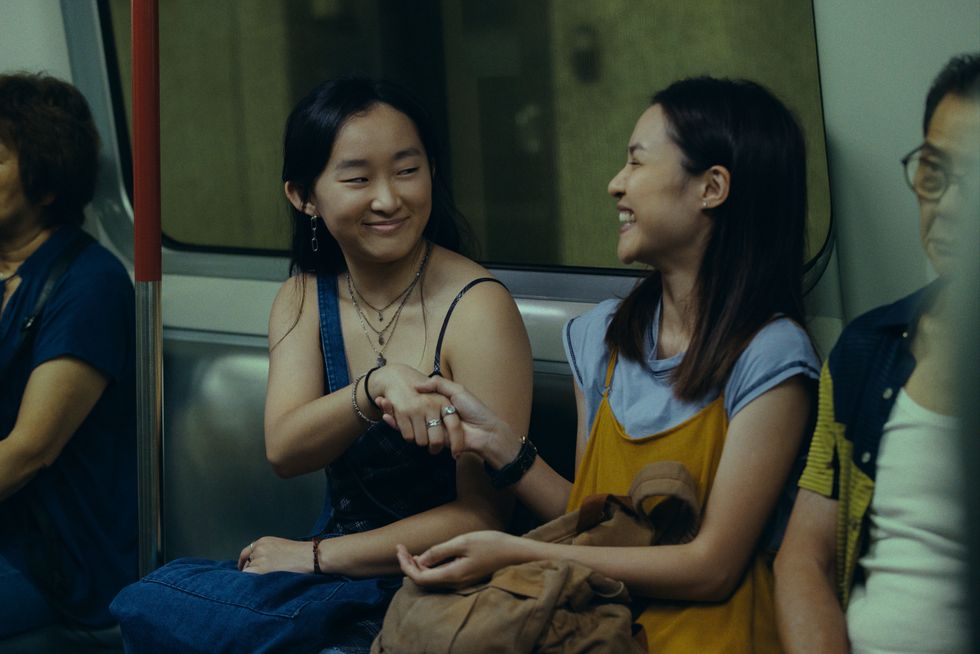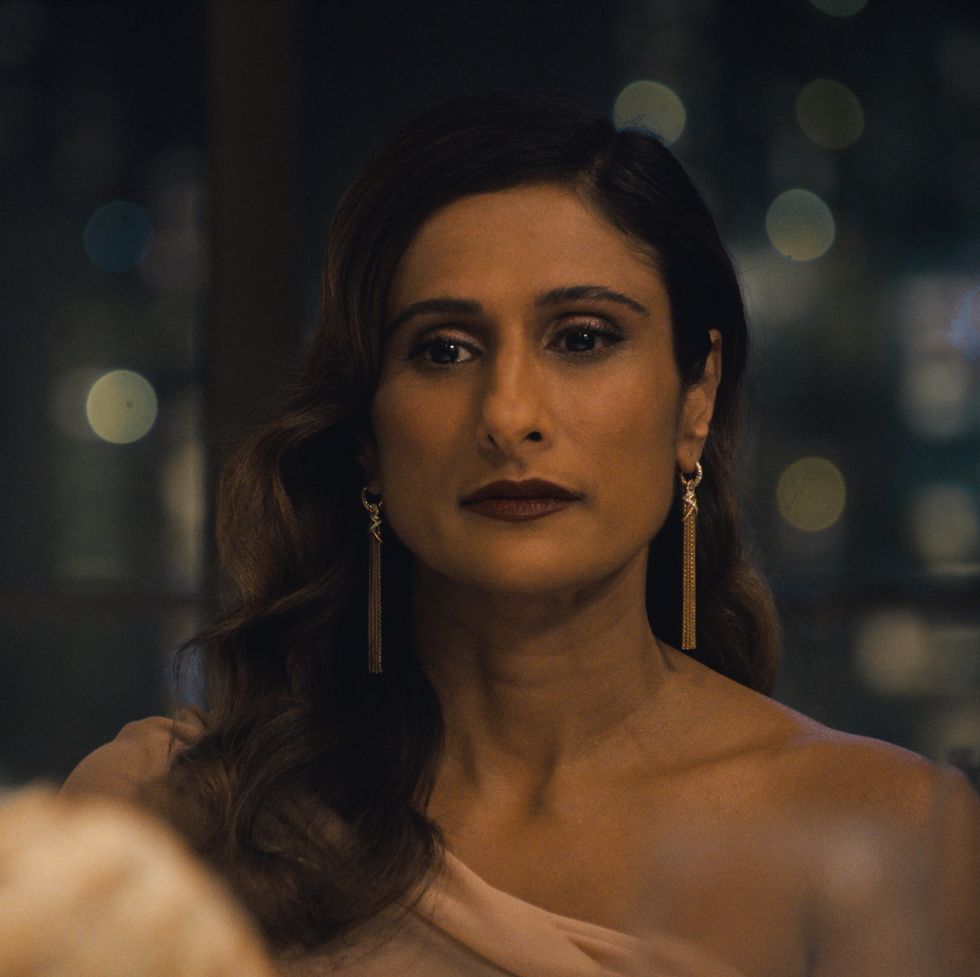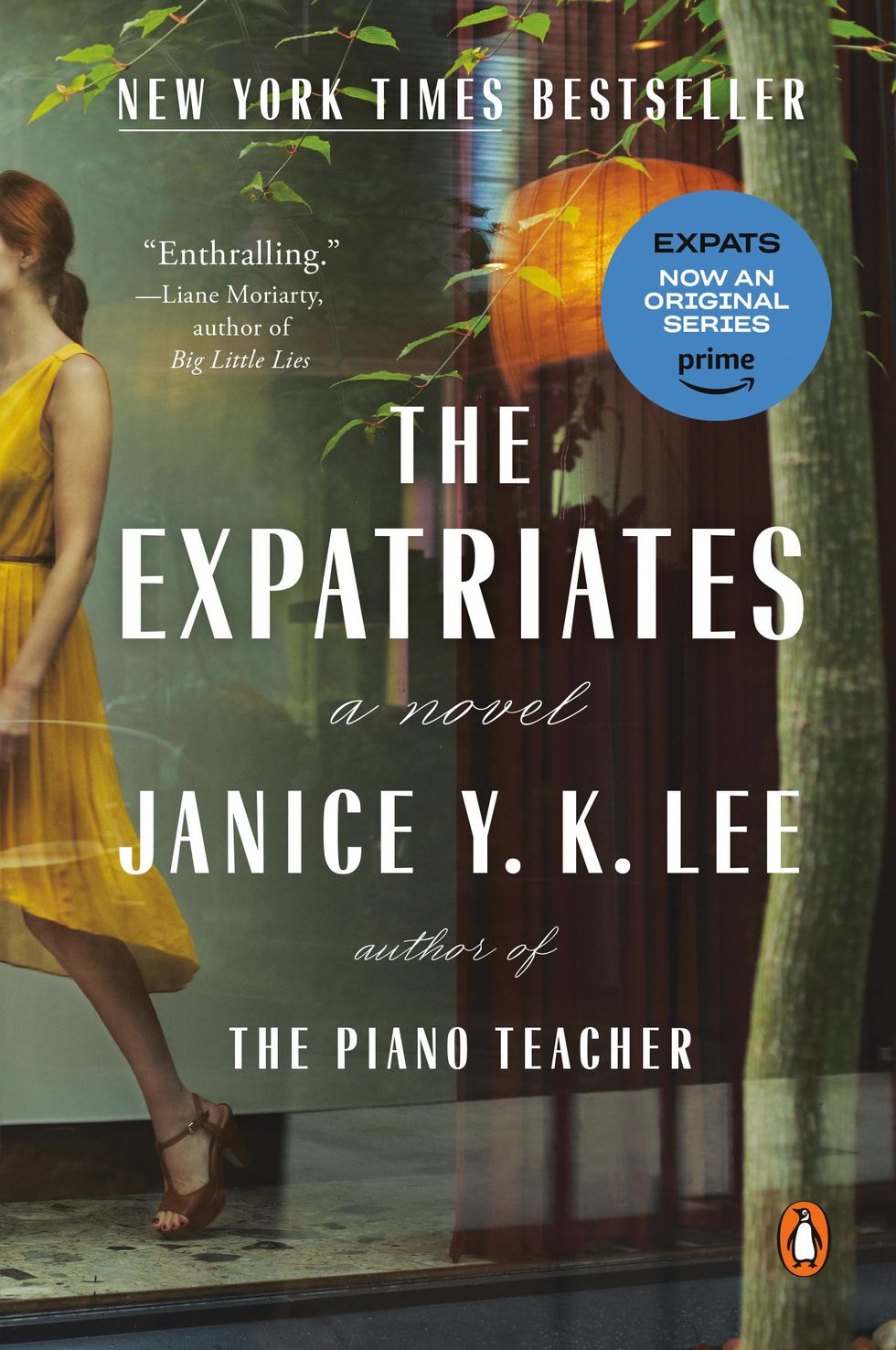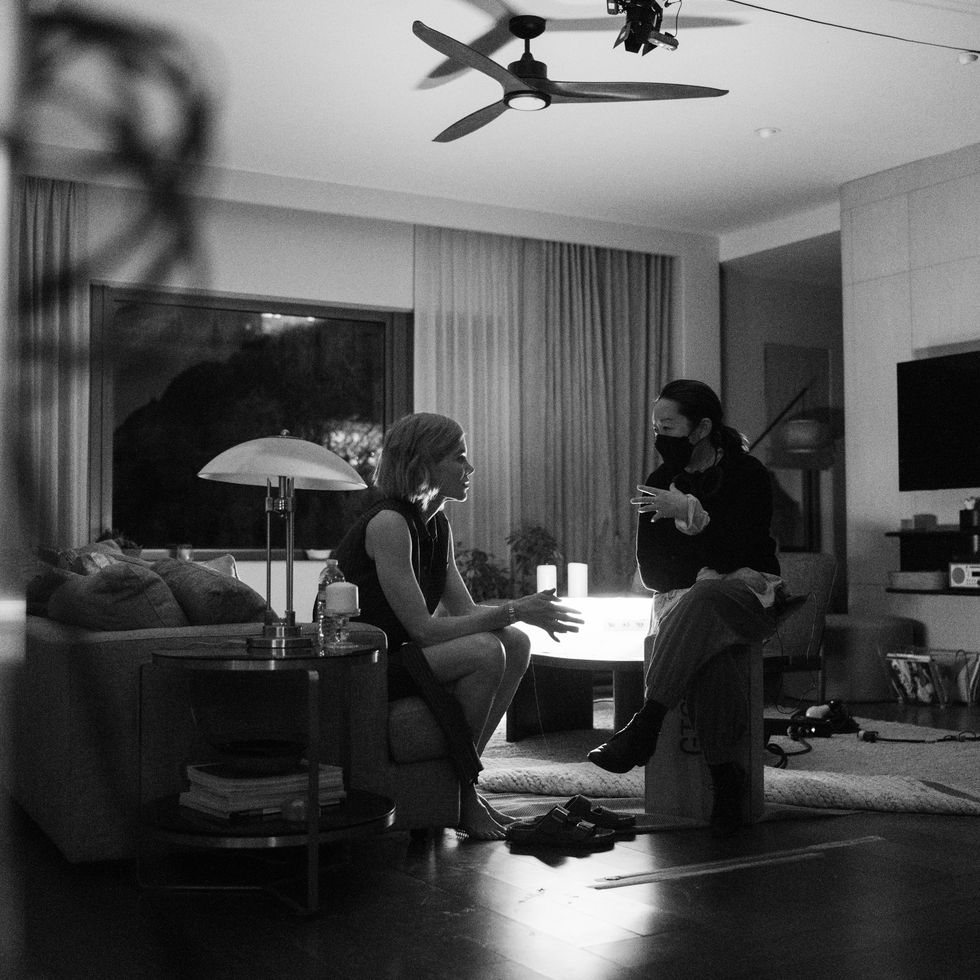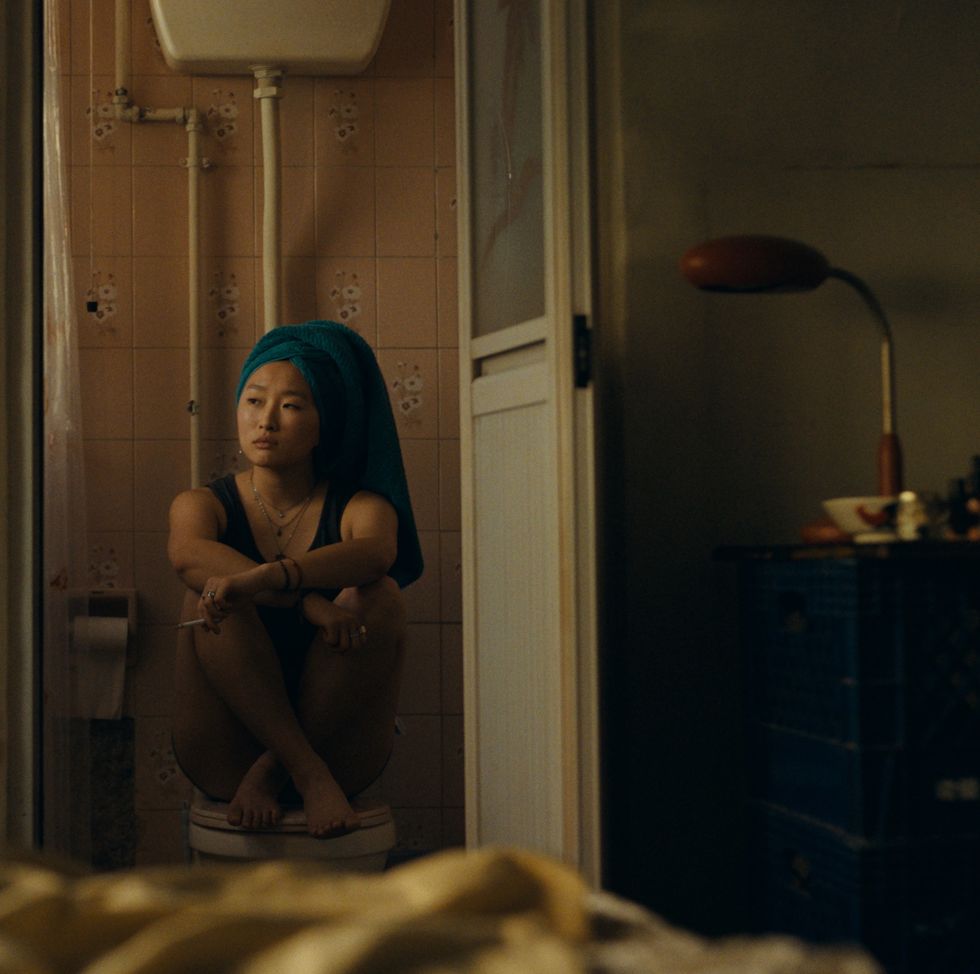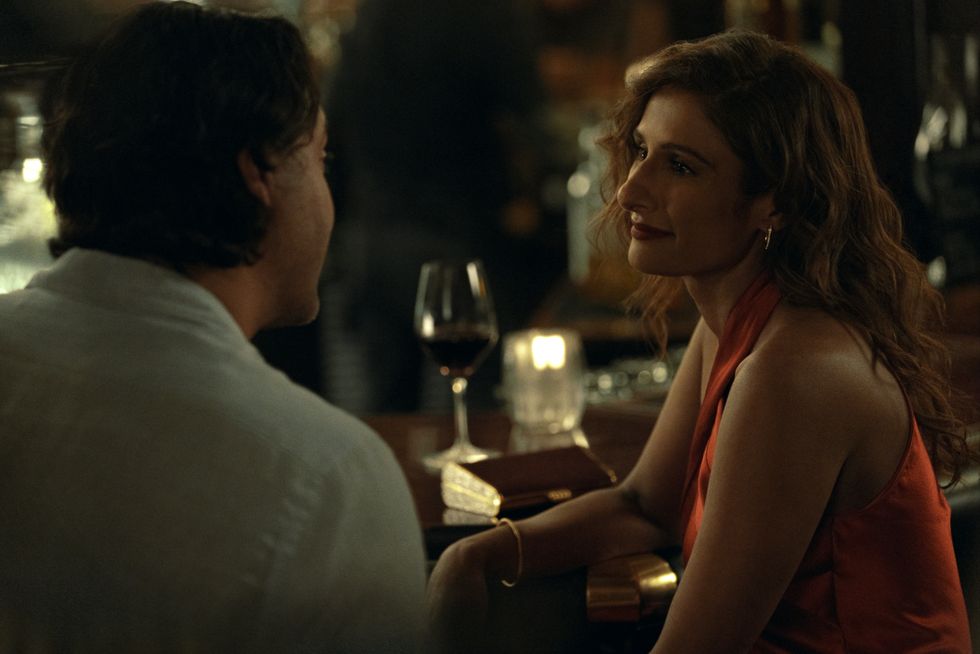Products You May Like
Spoilers for Expats below.
Motherhood is the central thread in Expats, the new Prime Video series helmed by Lulu Wang (The Farewell) and based on the novel by Janice Y.K. Lee. Whether characters are already moms, want to become moms, take care of other people’s children, or reject the title entirely, the series is laser-focused on how this sometimes fraught identity shapes womanhood by following three American women in Hong Kong after an incident that irrevocably changes them all.
When Margaret’s (Nicole Kidman) son Gus goes missing at the hands of her nanny-for-the-day Mercy (Ji-young Yoo) in the second half of the two-episode premiere, both women begin to grapple with their grief and contend with the confusion of who they are in the aftermath. Margaret cannot accept the fact that she’s now the mother of two, not three, kids, while Mercy is so shaken with guilt that she believes she doesn’t deserve happiness.
Meanwhile, Margaret’s friend Hilary (Sarayu Blue) is childless and constantly plagued by fertility questions from everyone in her life, though deep down she is questioning whether she wants to be a mother at all. (This is the biggest departure from the original novel). Her marriage is on the rocks, as is her friendship with Margaret, and she must confront her choices in life by interrogating her past—namely the relationship with her mother. Interwoven into all of this are the inherent class, wealth, and privilege structures that these expats experience, whether it’s hiring Asian people as the help in their homes or having an Ivy League education.
ELLE.com spoke to Blue and Yoo about relating to Hilary and Mercy’s journeys, how wardrobe expressed their characters’ inner monologues, and how they took care of themselves through the heavy subject matter.
Motherhood is one of the focal points of the series, in the ways that Margaret, Hilary, and Mercy are all challenged to think about their identities and desires as it pertains to kids. How did each of you connect to this overarching theme?
Sarayu Blue: Personally, it was the storyline I really resonated with. I love seeing this character question whether she wants to be a mom and go through this process of asking everyone close to her—her best friend, her husband, her mother—how do you know? Are you sure? It’s this real, vulnerable grappling with what if that’s not what I want? Is that allowed? Is that okay? And I just love seeing that space offered for anyone to ask that question. Furthermore, for her to be a character that’s so human, and at times really relatable and at times not. Often I feel that the way women who don’t want to be moms are depicted can be very one-dimensional and a bit harsh or abrasive or career oriented. I just love that Hilary is so human, and also maybe doesn’t want to be a mom.
Ji-young Yoo: I think Mercy’s relationship with motherhood is very complicated. I was 21 when I was first cast in the show so imagining motherhood at that age was not even on my radar. But I think for Mercy, it’s one of those things where it gets wrapped up in the idea of hope. That was something that we would talk about with the producers and the writers: Mercy feeling like motherhood is a representation of hope, and a fresh start and potentially redemption for her. But it’s also so tied up in feelings of guilt, especially as it relates to Margaret and the family.
For both of your characters, their mothers’ influences linger and we see more of their interpersonal relationships later in the series. How did you use the characters’ backstories to shape your performances?
SB: I’ll speak for a South Asian daughter. What Sudha Bhuchar [who plays Hilary’s mom] brought to the role was so precisely brilliant, her work is so specific and honest that it helped immediately inform my work. It’s all energy. I was just so excited to see a South Asian mom role that was written [with nuance]. You see South Asian moms that are so cutting and abrasive and sometimes that’s super believable, and other times it just feels a little stereotypical. What’s really great about the way it was written and then the way Sudha brought such truth to it, it was just undeniably human. There’s this really aggressively intense relationship between us and I think it just comes to life because how can it not?
JY: I think backstory always helps a character. What’s great is the actress Haerry Kim, who played my mother in the show [and appears later in the season] is so talented, and we actually met with a translator for a lot of the Korean to shape it and figure out what parts were going to be really harsh, what parts were going to feel very passive aggressive, and what parts will, especially for Mercy, lingually feel very American and feel maybe like the pronunciation isn’t quite where it should be. She is someone who grew up in an immigrant family but grew up in America, so with all of those little linguistic details, we got to really nerd out and really get into it. It was a lot of fun.
Your characters represent two ends of the spectrum in terms of wealth, but not necessarily access to privilege. How do you think Mercy and Hilary were shaped by their differing levels of access within this expat community?
SB: With Hilary, the privilege is so visible. It’s right there from the beginning: She grew up with money, she has money, she married a white guy and they have money. What’s really great about the show is that Lulu doesn’t shy away from that conversation.
JY: I think that’s one of the core elements of the show. That’s definitely something that Lulu was most interested in: showing the levels of privilege. Specifically with Mercy being someone who is both an immigrant and an expat—she grew up in New York, but immigrated from South Korea and is now an expat in Hong Kong, so she knows the experience of [both identities]. When it comes to privilege and choice and agency, I think Mercy believes that she doesn’t really have a lot of agency. One of my favorite moments in the show is when she gets called out for blaming everything on other people and never really taking responsibility for what’s happening in her life.
Sarayu, your character’s trajectory is slightly changed in this series compared to the book in regards to her stance on motherhood. How did you react to this change that Lulu Wang implemented? Do you remember any conversations that you both had about it?
SB: I loved it. It’s always a conversation. Lulu wanted to connect and talk about these things and make sure we understand the world. It was really important to her to show women who had varying passions, various callings, different experiences of life and I think it was really important to her to show a character who is unsure about motherhood. I love that because it’s a departure that feels really unique and so valuable.
I also loved that your character got a backstory about her Sikh upbringing. Were you involved in shaping that, even though you aren’t of Sikh descent?
SB: I was not involved in shaping that—in fact, I didn’t know that that was part of the storyline until after I got the role. One of the writers, Gursimran Sandhu, is [Sikh] and she really shaped a lot of Hilary because, of course, she’s South Asian. That’s where it comes into play and I love that they added all this specificity. Gursimran, Lulu, and even Sudha (who is Punjabi) and I had a lot of conversations so that I could really bring Hilary to life in a way that felt truthful and authentic. That was the most important thing to me.
There’s a great scene at the end of the first episode where Hilary and Margaret dance cathartically in a diner, the first time both of them are able to let go in a long time. Can you take me through filming that and any directions that Lulu gave?
SB: It was so fun. You watch Margaret and Hilary and you see what the joy of the friendship once was. That’s what’s so beautiful about that scene, and Nicole [Kidman] and I had an incredible time filming together. Nicole really wanted to keep that truth to it: Let’s just tell the story, let’s be actors in this thing together. To have this moment of pure joy and bigger abandon, it’s just fun. The chemistry between us was, I think, very palpable. We both felt it and then you shift and then all of a sudden, again there’s a pivot and you go right back into the pain that everyone is in. I think Hilary really misses Margaret. You see her longing for this friendship that once was. She misses her marriage. So to have that moment of joy cut by such an immediate [feeling of] well, that’s over is a really heartbreaking and beautiful moment.
Ji-young, Mercy is a very adrift character. Was it hard to get into that headspace?
JY: I definitely can relate to feeling like you don’t quite fit anywhere. I grew up in the middle of the United States in a very white neighborhood, frankly. So growing up where there weren’t a lot of people who looked like me or whom culturally I had relationships with, and at a time when the media landscape was very, very different, there is a lot of feeling like you don’t really see yourself anywhere, so you don’t quite know where you should go or what you fit into. I imagine a lot of Asian American people probably feel that way. That was actually one of the first things I connected to in Mercy: that feeling like you’re not enough, which is not a feeling I have anymore, but it’s something that I was used to and I really tapped into for this role.
Mercy has a distinct style with the asymmetric jewelry. What do you think this represents in her as a character?
JY: Malgosia [Turzanska, series costume designer] and I described Mercy as a “patchwork.” There’s lots of plaids, lots of shirts that have been cut that Mercy has cut herself. Similarly her character is taking bits and pieces from different parts of her life and seeing if she can mold it into something that works. Jewelry is a big part of that. In my brain, the asymmetry came out of these symbols from across cultures for good luck. We wanted to bring in little tokens that might be a talisman for good luck that she can use to ward off what she believes is a curse and bad luck that follows her around. Mercy is also just a bit of a mess, so I would totally buy her losing one earring, but still really liking the way it looks.
In the pilot, we found out that Mercy is sleeping with Hilary’s husband, David, and he bails on Margaret’s party. Relationships for both of them are difficult—how did you both approach their struggles with romantic love?
SB: So much of that was on the page and then the chemistry was so easy. Jack [Huston, who plays David] is so wonderful to film with because he’s very playful. He’s up for anything and a real partner in crime. He and I had a few conversations and got to really think about where we once were to get us to where we are now. I really feel that a lot of the work didn’t feel like work. It felt so built into the storyline that it didn’t feel difficult to create.
JY: Mercy and David do not have a love connection; I honestly think they exist in each other’s lives to hurt each other. That’s what they want from one another and that’s something that Jack and I talked about. We’re building that relationship because they both, for various reasons, see themselves as perpetrators. They both feel like they haven’t been substantively punished. So they use one another to get that, and it’s weird and twisted and sexual and strange. Mercy’s romantic relationships, like many people’s relationships, are informed by the trauma that they’ve experienced in their life. [At the beginning of the series] Mercy doesn’t really believe that she’s deserving of love and doesn’t really think that she’s capable of giving love that people deserve.
Grief and guilt are other central themes at play. How did you take care of yourselves when dealing with this subject matter?
SB: There is an element of these scenes that can get really emotional, and I will feel very drained or spent at the end of the day. But I am able to distinguish between the character and me—I may feel the feeling, but I’m not living that life. It’s a little bit of releasing it for the day. I am going to live with it, but it’s not going to inform my personal life.
JY: I got massages. I tend to hold stress in my body. I would go on a lot of walks. What’s amazing about Hong Kong is it’s such a walkable city, so anytime I felt like I needed to clear my head, it’s safe to just hop on the MTR [Mass Transit Railway] to go to a museum, walk around, get some fresh air, or read a book. The city is so vibrant and so alive, that it was easy to find things to help get you out of work.
This interview has been edited and condensed.
Radhika Menon is a freelance entertainment writer, with a focus on TV and film. Her writing can be found on Vulture, Teen Vogue, Bustle, and more.

